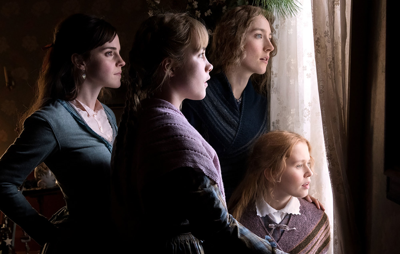
As I sat down to watch Little Women, I wrote in my notebook, “What new lessons can old works teach us?” I was doubtful. This is the fifth film adaptation of Louisa May Alcott’s 1868 novel. Is another one really necessary? But I didn’t take any other notes that evening — I couldn’t take my eyes off director Greta Gerwig’s stunning, fierce testimony of love, even for a second.
The story follows the lives of four sisters who live with their mother amid the fallout of the Civil War, with Gerwig’s adaptation drawing on Alcott’s life as well. We grow up with the March sisters, and witnessing their trials through Gerwig’s lens is a pure and complete joy.
Saoirse Ronan, who starred in Gerwig’s 2017 Best Picture nominee Lady Bird, plays Jo March, the headstrong second daughter and hero of the story. Jo is perpetually scribbling on sheets of paper, writing plays for the family to perform or dashing off torrid short stories to sell to The Weekly Volcano, a print rag that’s edited by the smarmy Mr. Dashwood (Tracy Letts). Dashwood advises Jo to make her stories “short and spicy, and if the main character’s a girl, make sure she’s married in the end.” Ronan is radiant, embodying Jo’s independent spirit as well as her quick temper.
She is matched by Timothée Chalamet as Laurie, the rich neighbor boy who loves her. Chalamet is charming and playful while conveying his character’s deep sense of loneliness, which is assuaged when he becomes an honorary member of the March family. Sisters Meg (Emma Watson) and Beth (Eliza Scanlen) accept him after some initial misgivings, while their mother is immediately welcoming. Laura Dern is transformed as the ever-giving Mrs. March. Gerwig wisely trimmed some of the matriarch’s more tiresome speeches that appear in the novel.
But the most surprising performance comes from Florence Pugh as Amy, the youngest daughter — an artist who feels she’s lived in the shadow of Jo all her life. Amy is vain, selfish and spiteful, always either smirking or sobbing from beneath her abundant blond curls. Pugh doesn’t hold back from embracing these qualities, but she brings a sense of self-possession to the role that finally gives the character the same depth as her sisters, perhaps even more depth than in Alcott’s original creation.
It’s hard to imagine a film more packed with talent, and we haven’t even gotten to Meryl Streep, who plays the spinster Aunt March. Aunt March held onto her inheritance, knowing she’d need it. (The girls’ father, away serving in the Union Army, spent his inheritance educating freedmen.) Throughout the film, Aunt March warns the girls that the only way to live one’s life unmarried is to be rich. Since they lack wealth, they’d better focus on finding a husband. She is harsh and disdainful — but she’s also right, and her love for her nieces is demonstrated through her frank warnings. Streep is hilarious in the role, reminding us — as if we need reminding — of her tremendous range.
Gerwig structures the story to be told in flashbacks, cutting back and forth across time. It’s a bold choice. At first, the technique is a bit disorienting, but most viewers ought to adapt quickly, and the rewards are many. The structure adds resonance to the family’s memories, and it shows us that childhood — idyllic and difficult — never really leaves us. That message has always been at the heart of Little Women, so I return to my original question: What new lessons can this old work teach us?
In one scene late in the movie, Jo tells her sisters that she doesn’t expect her latest work of fiction to sell. It contains no murders, betrayals or scandals. Instead, it is based on their lives together. “Who would be interested in a story of domestic struggles and joys?” she asks. “It doesn’t have any real importance, does it?”
“Maybe it doesn’t seem important because people don’t write about it,” Amy replies.
I burst into tears. It’s been an exceptional year for women in cinema, from Lulu Wang’s The Farewell to Mati Diop’s Atlantics and Olivia Wilde’s Booksmart — plus scores of indie films that I’m still discovering. But the roles written for women in two of 2019’s most critically acclaimed films — Once Upon a Time … in Hollywood and The Irishman — give the actresses little to say. Margot Robbie and Anna Paquin, respectively, serve more as symbols than characters. This feels emblematic of national trends. In the 100 highest-grossing films of 2018, male speaking roles outnumbered those of females at a rate of 2.2 to 1. This is not reflective of our population. It’s not reflective of our value to the world.
Alcott knew this in 1868. Gerwig, Wang, Diop and Wilde know this now. But we are far from mastering the lesson, so it bears repeating. Art confers meaning, and meaning creates empathy and kinship. When women are reflected in cinema, we all benefit. Little Women is a masterpiece of filmmaking that we will watch for generations.





